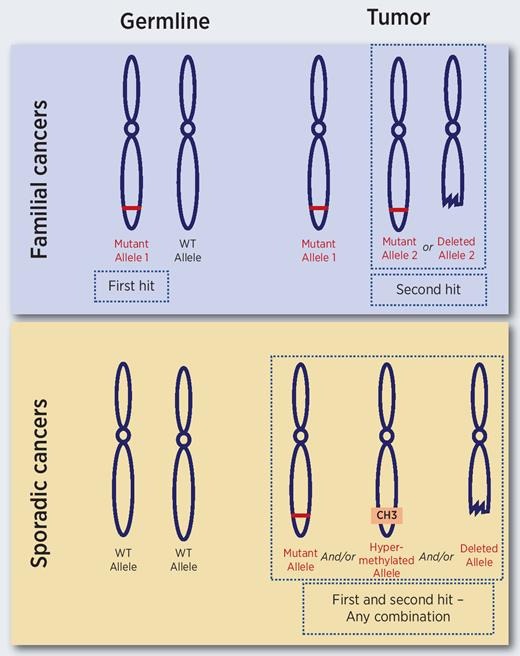The Spike Protein and the “Two-Hit Hypothesis” of Cancer Causation
The Spike Protein’s Suppression of p53 and BRAC May Mimic a Second Hit
The two-hit hypothesis meets epigenetics. By the 1990's, Knudson's two-hit hypothesis had evolved to postulate that familial cancer predisposition is due to a germline mutation in a TSG (top left), while actual cancer development follows a sporadic mutation (or deletion) in the second allele (top right). It also postulated that sporadic cancers of the same tissue type were due to two acquired hits (mutation or deletion) in the same TSG (bottom). The paper by Kane and colleagues (and other papers in that period) revised that model for sporadic cancers to include epigenetic inactivation by promoter DNA hypermethylation as either the first hit, the second hit, or both (bottom right). The figure is a simplification; subsequent data showed that in very rare cases familial cancers can be caused by germline hypermethylation, that the second hit in familial cancers can also be DNA hypermethylation, and, in the case of MLH1 in colon cancer, the “hits” in sporadic cases are almost always hypermethylation caused by the CpG island methylator phenotype.
The number of physicians reporting massive increases in new cancer cases is astounding. Evidence is also emerging, even in the MSM.
A new review of cancer registry records from 44 countries found that the incidence of early-onset cancers is rising rapidly for colorectal and 13 other types of cancers, many of which affect the digestive system, and this increase is happening across many middle- and high-income nations.
The review’s authors say the upswing in younger adults in happening in part because of more sensitive testing for some cancer types, such as thyroid cancer. But testing doesn’t completely account for the trend, says co-author Shuji Ogino, a professor of pathology at the Harvard T.H. Chan School of Public Health.
Ogino says the spike is due to an unhealthy stew of risk factors that are probably working together, some which are known and others that need to be investigated.
A global epidemic of cancer among people younger than 50 could be emerging
https://www.cnn.com/2022/10/14/health/early-onset-cancer-increase/index.html
Ogino is extremely vague in his assessment as to why this increase is occurring. For a Harvard professor to say “an unhealthy stew of risk factors that are probably working together” is alarming. It is a statement that one would expect to see in a paper hastily written the night before it’s due by a high school student trying to explain the increase.
I believe that SARS-CoV-2, and the Spike Protein in particular, have a prominent role in the dramatic increase in cancers. Yes, the chronic inflammation is certainly a cause, and I propose an additional cause:
The Spike Protein acts as a “Second Hit” in the “Two-Hit Hypothesis” of Cancer Causation.
There may be a genetic predisposition element to this.
It is known that when one allele of a gene is mutated or deleted, the expression of that gene is affected.
The evidence suggests that given a large enough population, most, if not all genes may have allele-specific expression differences in at least some individuals and finding the genetic origins of each of these and linking the former to a possible phenotype must be a major long term goal of the biomedical community.
Allele-specific gene expression differences in humans
https://academic.oup.com/hmg/article/13/suppl_2/R255/619677
Now, it is known that the Spike Protein interacts with p53 and BRAC, effectively reducing their expression as if a second allele had been deleted or mutated. This is how the Spike Protein may be acting as the Second Hit. Even if temporary, it may be enough in those susceptible to cause cancer.
S2 Subunit of SARS-nCoV-2 Interacts with Tumor Suppressor Protein p53 and BRCA: an In Silico Study
https://www.ncbi.nlm.nih.gov/pmc/articles/PMC7324311/
In summary, those who already have one of the Tumor Suppressor Gene alleles mutated or deleted, may have an increased risk of cancer induction when the Spike Protein of SARS-CoV-2 reduces the amount of tumor suppressor proteins.




When the Covid Gene Treatment was first rolled out here in Aus, 4 of the 5 men in my workplace all went early for their jab.
A few week to couple of months later, those same 4 all had skin cancer flare ups - ie removals.
Surely not a coincidence eh?
Sounds like Dr Chesnut is saying a Covid infection may be enough to trigger a cancer in the susceptible, however it stands to reason that since the vaxx turns you into a spike-producing machine of unknown duration, it makes things far worse for those with a genetic disposition.